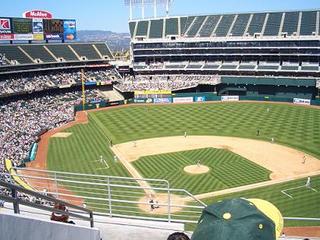
Fanning the Game
Yesterday afternoon I went to an Oakland A's game. That's A's as in Athletics, not grades, in case anyone was wondering like my 11-year old self. The national anthem caught me with a full left hand, cold soda in my right hand, and nowhere to put it down, so my heart was mildly chilled by the time it was over. But the air was warm without being grilling, the sky was bright and clear and striking blue, the sun dazzled but not too much, and red-winged blackbirds and yellow-flecked swallows swooped and dipped over the stadum. The field was a lovely patterned green, aching to be stared at sans sun glasses. Luckily I kept my glasses and jacket on because more than halfway throught the game the Scoreboard display system informed us that the UV rating for the day was VERY HIGH. "Now you tell us!," we griped, and further cowered beneath jackets and bandanas. But we were happy to see some sun after so much fog.
We left early, which was probably a good thing--exactly as we got up and made our away around the stadium The Kansas City Royals recovered from a 3-0, Oakland winning, seemingly done-deal in the 8th inning, and got to 4 runs before we even made it to the BART station. The Royals stuck it out to a 12th inning to win with 5. D'oh.
The Athletics are famous for their efficient, low-budget, very rational way of maintaining talent and playing ball. It's been detailed in Moneyball by Michael Lewis, and it's a fair guess that letting the former bond trader sit in on the A's scheming was a stroke of publicity genius for general manager Billy Beane. A number of my East Bay fellows have brought up the book's description of a rational, thrifty underdog team up when describing why they're fans. The result, however, is that if someone gets really good, the team sells them.
Scotto was saying how his fandom of certain players basically ends when they leave. He's really a fan of the team as an idea and an organization--how it's run, how it plays--and not as a collection of individual stars. He likes the combination of rational, statistical analysis, and (usually) winning underdog status. Later Scott's model of fandom struck me as a more accurate reflection of what professional sports are. These teams are franchises--companies-that provide a pretty cheap and gratifying product (the entertainment of winning). One can be fan of them much the same as one can be a fan of Google or Six Degrees Records or Mini-Coopers. But it seems fundamentally different from the idea of fandom I grew up with--supporting members of my community in their pursuit of athleticism and the fulfillment of talent much as they would support me in my pursuit of writing. I'm beginning to accept that that's really only a realistic model for school and amateur sports. But it's interesting that the professional version generates a lot more action, attention, money and glory than the amateur version.